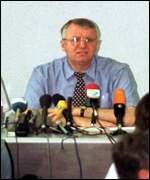Albania is the first nation to eliminate its complete stockpile of chemical
weapons.
In a remote corner of southern Europe the United States and Albania recently
scored a quiet but important victory in the battle against the spread of
weapons of mass destruction. This success points the way toward helping resolve
some of the greatest threats the world faces from nuclear, chemical and
biological weapons.
The location was Albania's mountainous interior. During the Cold War, the
predominantly Muslim nation was a Maoist dictatorship, the most isolated country
in Europe and one of the most anti-Western in the world. Its journey from
tyranny toward democracy has been determined but fitful -- just a few years ago
the country's economy and government collapsed when the population was
seized by a nationwide Ponzi scheme.
Albania's current leadership, however, is eager to join the West and to
eradicate the legacies of the Communist past. One of the most frightening of
those legacies was a secret cache of deadly chemical weapons and materials, 16
tons of lethal agents that had been illegally imported during the 1980s by an
earlier government. Discovered only in 2002, these chemicals posed an enormous
danger to Albanians, should they have leaked, and to the rest of the world if
they fell into the hands of terrorists or criminals.
Luckily, the government in Tirana recognized the risk and promptly sought out
assistance from the United States. I visited the weapons site in Albania in
August 2004, to discuss plans for making security upgrades to the storage
facility, and to help arrange for the stockpile's destruction under new
provisions of the Nunn-Lugar Cooperative Threat Reduction Program.
Launched 15 years ago, the Nunn-Lugar program has concentrated primarily on
securing and destroying nuclear, chemical and biological weapons in Russia and
other states of the former Soviet Union. In 2003 I introduced legislation
signed by President Bush to expand the Nunn-Lugar concept worldwide.
The president authorized a Nunn-Lugar weapons destruction project for
Albania, and American and Albanian officials worked out a plan for the complicated
and dangerous operation. Experts at the Pentagon's Defense Threat Reduction
Agency, which has over the years gained great experience in the complexities
of how to destroy weapons safely, arranged for the fabrication of the
specialized equipment necessary.
Beginning last year, a team of U.S. contract workers, operating under Defense
Department supervision, trucked the equipment and other materials up
primitive mountain roads to the remote weapons site. There they constructed a
warehouse-sized destruction facility to take the barrels of chemicals from the
nearby bunker and destroy them.
Last month, the Albanian Defense Ministry announced that Albania is the first
nation to eliminate its complete stockpile of chemical weapons. The
destruction of all 16 tons had been successfully completed. A potential terrorist
threat was peacefully neutralized, and the United States forged closer links
with an emerging nation, laying the groundwork for future cooperation.
This was an important first test of the Nunn-Lugar program outside the former
Soviet Union, proving that we can work with other governments in new
environments. And it shows the value of expanding the Nunn-Lugar program so that
the United States can respond to non-proliferation opportunities wherever they
may appear.
Russia, of course, will continue to be a focus of our weapons-destruction
efforts. So far, Nunn-Lugar has deactivated 6,982 nuclear warheads, all
previously aimed at the United States, and destroyed more than 1,500 long-range
missiles. The program also secures and destroys chemical and biological weapons,
and seeks to re-employ scientists in peaceful research so they won't be
tempted to sell their skills to rogue states or terrorist organizations.
But the Albanian success shows that we can and must be prepared to address
similar risks in the Middle East, Asia, and anyplace else where supplies of
weapons of mass destruction may be. The United States has developed a unique
capability to meet a variety of proliferation threats, and we should be actively
seeking new opportunities to dismantle dangerous weapons programs.
One of the most immediate occasions could be North Korea, which has resumed
the six party negotiations aimed at eliminating its nuclear weapons program.
If a final agreement can be reached, the Nunn-Lugar program could play a
central role in neutralizing the grave threat posed by the nuclear weapons and
materials that Pyongyang has accumulated.
But this will require firm policy guidance and aggressive diplomacy by the
administration to gain North Korea's cooperation. The time to begin that
process is now, well ahead of a final deal. With persistence and constant attention
from the highest levels of the government, we can repeat the success of
Albania in our most crucial challenge.
Sen. Richard Lugar, R-Ind., is ranking member of the U.S. Senate Foreign
Relations Committee.





















No comments:
Post a Comment